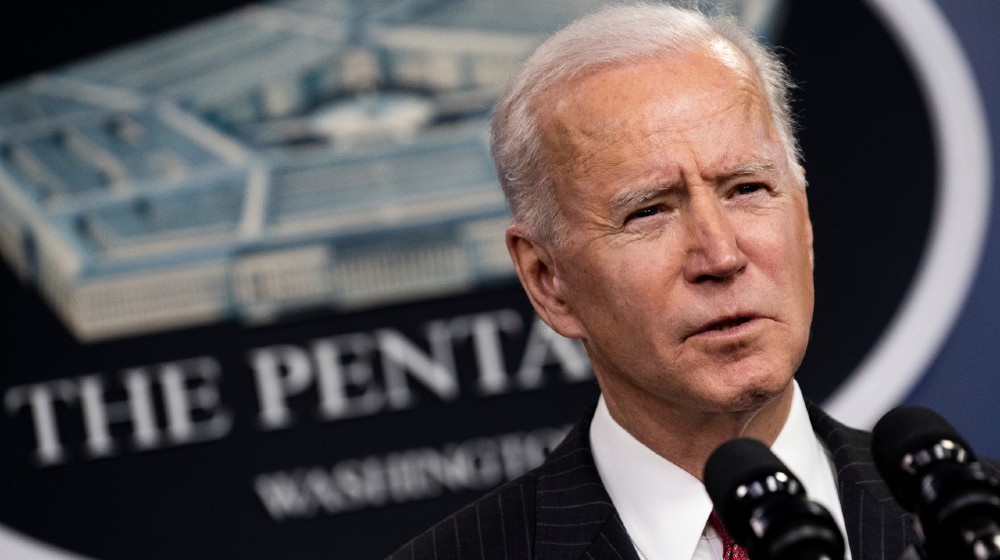US News
Needed: A Disciplined Foreign Policy

President Biden has announced that all U.S. ground troops will be removed from Afghanistan by September 11th, 2021. This is long overdue.
Former President Trump had wanted them home sooner but was met resistance from the military leadership and neoconservative interventionists-the same crowd that thought they could bring democracy to Afghanistan and Iraq.
RELATED: All US Troops In Afghanistan Will Be Home by Sept 11
Needed: A Disciplined Foreign Policy
[T]here appears to be no logical connection between the administration's actions and statements because there is no overall guiding doctrine within which the administration approaches the world.
In April, the Biden administration also announced its plans to rejoin the nuclear deal with Iran, even as Iran increases its uranium enrichment to 60%.
Meanwhile, the Secretary of State and National Security Adviser held a meeting with their Chinese counterparts in Alaska, where Chinese officials berated the United States, and U.S. officials admitted to America's imperfections.
President Biden recently met with Japan's Prime Minister as well, in a show of solidarity against China's aggressive moves in the Indo-Pacific. At the same time, the Biden administration imposed sanctions on Russia, and the President called Vladimir Putin a killer.
We are witnessing an undisciplined foreign policy: there appears to be no logical connection between the administration's actions and statements because there is no overall guiding doctrine within which the administration approaches the world.
In his book Diplomacy (1995), Henry Kissinger discussed the two dominant strains of U.S. foreign policy throughout its history, and the presidents most commonly associated with them: realism as practiced by Theodore Roosevelt, and Wilsonianism as practiced by Woodrow Wilson.
Kissinger concluded that our foreign policy would likely always consist of a combination of the two because both are embedded in the American foreign policy tradition.
I disagree. Instead of a realism/Wilsonianism choice/combination, what is needed is a disciplined foreign policy: a foreign policy guided by fundamental interests related to national security.
THE BALANCE OF PRINCIPLE AND CONSTRAINTS
A disciplined foreign policy requires an organizing principle or principles that policymakers can use to identify important versus peripheral national security interests so that resources can be prioritized.
America had such an organizing principle during the Cold War-it was called containment of the Soviet Union. For 45 years, global events and developments were viewed by U.S. policymakers through the lens of the doctrine of containment-as set forth publicly in George Kennan's famous “X” article in Foreign Affairs, as well as the de-classified national security document NSC-68.
“Foreign policy consists in bringing into balance, with a comfortable surplus of power in reserve, the nation's commitments, and the nation's power.” – Walter Lippmann
Containment was based on a broader geopolitical insight: American security could be threatened by a hostile power or alliance of powers that controlled the major power centers of the Eurasian landmass.
This geopolitical insight was best expressed in the writings of Alfred Thayer Mahan, Halford Mackinder, and Nicholas Spykman. Its policy roots can be traced back to the British Empire's tradition of attempting to maintain a balance of power on the European continent.
But it's not enough to have an organizing principle. A disciplined foreign policy also requires constraints, perhaps the most important of which is that a country's foreign policy must correlate means and ends.
In his book U.S. Foreign Policy: Shield of the Republic (1943), Walter Lippmann put it this way: “Foreign policy consists in bringing into balance, with a comfortable surplus of power in reserve, the nation's commitments, and the nation's power.”
Lippmann famously criticized containment for being unbalanced-our commitments (to counter all Soviet or Soviet-inspired aggressive moves anywhere along its geographical periphery), he believed, exceeded our resources, and containment failed to prioritize areas or regions that we were pledged to defend. The outcomes of the Korean and Vietnam Wars appeared to confirm the wisdom of Lippmann's critique.
Other events in American history also provide important lessons about the need for a disciplined foreign policy. George Washington's policy of neutrality during the war between France and Great Britain in the aftermath of the French Revolution was an example of a disciplined foreign policy: free of sentiment for France (which helped us win the War of Independence) and mindful of the relative weakness of America among the world's great powers at that time.
The War of 1812, on the other hand, demonstrates the folly of an undisciplined foreign policy. While the Jefferson and Madison administration starved the Navy, Congress not only declared war against Great Britain-whose navy stood between a French-dominated Europe and the United States-but also came uncomfortably close to simultaneously declaring war against France.
The result was the burning of the nation's capital by British forces, and likely defeat in the war had not Britain been distracted by events on the continent.
And had the United States helped France defeat Britain and Napoleon acquired the British Navy, there would be nothing to prevent Napoleon from invading or Findlandizing the United States?
Even Jefferson belatedly recognized this. “Surely none of us wish to see Bonaparte conquer Russia and lay thus at his feet the whole continent of Europe,” Jefferson wrote. “This done, England would be but a breakfast Put all Europe into [Bonaparte's] hands, and he might spare such a force to be sent in British ships as I would as leave not have to encounter.”
A decade later, in 1821, Greek revolutionaries fought for their independence from the Ottoman Empire and petitioned the United States for assistance.
On July 4th of that year, Secretary of State John Quincy Adams delivered an address explaining why the U.S. would not intervene, demonstrating his grasp of the importance of a disciplined foreign policy.
“Wherever the standard of freedom and independence has been or shall be unfurled,” Adams said, “there will [America's] heart, her benedictions and her prayers be.
But she goes not abroad in search of monsters to destroy. She is the well-wisher of the freedom and independence of all. She is the champion and vindicator only of her own.” Adams approached world politics, like George Washington, without sentiment and emotional attachments to any cause or country, except his own.
A disciplined, realistic appreciation of his country's national security interests and its limitations informed Adams' worldview.
Similarly, during the Civil War, Union warships captured two Confederate envoys from a British steamer. Britain protested vigorously and threatened war unless the United States released the envoys.
President Lincoln, against much sentiment in his war cabinet, ordered the envoys released, remarking that the Union could only fight one war at a time. Lincoln demonstrated a fine sense of the need to balance means and ends-which is the essence of a disciplined foreign policy.
AN AD HOC FOREIGN POLICY WILL FAIL
A U.S. administration that was guided by an organizing principle based on the maintenance of geopolitical pluralism in Eurasia would not pick diplomatic fights with Russia and China at the same time.
One of the most serious developments in global politics is the ongoing strategic cooperation between China and Russia-the two greatest powers on the Eurasian landmass. And both of those countries have increasingly aligned themselves with the Mullahs in Iran.
The Biden administration, on the other hand, seems to approach foreign policy in an ad hoc manner, without the discipline of a geopolitical doctrine or an appreciation of America's limitations.
The result of President Biden's undisciplined foreign policy-which, to be fair, is similar to the Obama foreign policy in important respects (and includes many of the same policymakers)-is a reversal of the accomplishments of the Nixon-Kissinger diplomacy of the early 1970s that widened the Sino-Soviet split and greatly reduced Russia's influence in the Middle East, all to America's benefit.
Nixon and Kissinger understood the importance of maintaining the geopolitical pluralism of Eurasia-that geopolitical insight informed their foreign policy, which is why they positioned the United States closer to China and Soviet Russia than either Eurasian power was to each other. And the United States became the key interlocutor in the Middle East, greatly reducing Soviet influence in the region.
The Biden administration, on the other hand, seems to approach foreign policy in an ad hoc manner, without the discipline of a geopolitical doctrine or an appreciation of America's limitations. President Biden so far has picked diplomatic fights with both China and Russia, while simultaneously reaching out to the Mullahs in Iran to rejoin the nuclear deal, much to the chagrin of Israel and moderate Arab regimes in the region.
Today, we are faced with a new version of the Sino-Soviet bloc-which NSC-68 sought to address in 1950-and the growing influence of Russia, China, and Iran in the Middle East.
China and Russia are cooperating in the Arctic Ocean, their economic and energy ties have strengthened, and they have increased their bilateral and multilateral military exercises.
A recent editorial in the Global Times, the English language mouthpiece of the Chinese Communist Party, lauded the Sino-Russian “strategic partnership.”
A 2020 study by the Marshal Center warned that “actions by the United States that similarly threaten Russia and China or present a common security challenge will have the effect of driving the two countries closer together.” History teaches us that an undisciplined American foreign policy cannot effectively meet these challenges.
The post Needed: A Disciplined Foreign Policy. appeared first on Human Events.
Article Source: NewsEdge
You Might Also Like:
- Republicans Won’t Back Biden’s $4 Trillion Plans
- Archbishop: Pro-Abortion Democrats Shouldn’t Take Communion
- US Claims China Acting ‘More Aggressively Abroad
Keep up to date with the breaking news by following us on Facebook and Instagram.












